As our first blog, we thought what better way to explain what we do than by sharing the following report with you. This report was taken from the USCG website and re-edited by us to summarize it. If you wish to read the whole thing, just Google “TOP 10 small passenger vessel deficiencies.” The USCG conducted an analysis of all deficiencies recorded by CG Marine Inspectors while inspecting certificated Small Passenger Vessels. The purpose of this analysis was to identify the 10 most common deficiencies to share with Small Passenger Vessel Owners so problems can be rectified prior to scheduling their next Coast Guard examination. As a yacht management company, we ensure these issues are proactively managed to keep your vessel in top shape.
1. Dead End Wires (46 CFR 183.340)
All cables or wires must serve some piece of equipment or system onboard the vessel. In situations where a piece of equipment or system is removed and not replaced, the cable or wire that serviced the equipment or system must also be properly removed from the power supply. Our management service ensures that situations like this won’t happen.
2. Deteriorated Hull Material (46 CFR 189.40; NVIC 7-68; NVIC 8-87; NVIC 7-95)
Routine examinations of a vessel’s hull both internally and externally are critical to safety. Different hull materials have specific vulnerabilities. For instance, wood vessels may have wasted wood planking, while steel-hulled vessels might suffer from rusting or cracked welds. Our professional managers inspect your yacht to ensure it remains seaworthy.
3. Inoperable Bilge High-Level Alarm (46 CFR 182.530)
All certificated small passenger vessels 26 feet or greater must have visual and audible bilge high-level alarms. Regular testing of these alarms is essential. Our crew includes routine checks and maintenance of bilge alarm systems to prevent any operational failures.
4. FCC Station License Missing (46 CFR 184.502 & 47 CFR 80.13)
Marine Radios, EPIRBs, and AIS equipment required to be installed on small passenger vessels must comply with FCC requirements. Many vessels lack the necessary FCC Station License for their marine radio. Our yacht managers are familiar with regulations like this, ensuring all your equipment complies with regulatory standards so you won’t be caught out of compliance.
5. Running Lights (Stern, Mast, Side) Inoperable (46 CFR 183.420)
All vessels must have navigation lights in accordance with the International and Inland Navigation Rules. That too is included in our regular checks to ensure your navigation lights are fully operational.
6. Expired First Aid Kit Medication (46 CFR 184.710 & 46 CFR 160.041)
All certificated small passenger vessels must have a first aid kit with up-to-date medications. We will check that your first aid kit is always fully stocked and compliant with regulations.
All certificated small passenger vessels must carry appropriate and current navigational charts. Our yacht logistics services include keeping all necessary nautical publications up to date to ensure safe navigation.
8. Expired EPIRB Hydrostatic Release (46 CFR 180.64)
All small passenger vessels operating on the high seas or three miles beyond the coastline must have an FCC Type Accepted Category 1, 406 MHz EPIRB installed. Our yacht compliance services involve regular inspections of your EPIRBs to ensure they are in perfect working order and replaced before expiration. By addressing these common deficiencies, our comprehensive yacht management services ensure your vessel remains safe, compliant, and ready for the seas. From technical support and maintenance to regulatory compliance and provisioning, we cover all aspects of yacht management. If you have any questions or need further assistance, please feel free to reach out to us. We’re here to help keep your yachting experience smooth and enjoyable.

